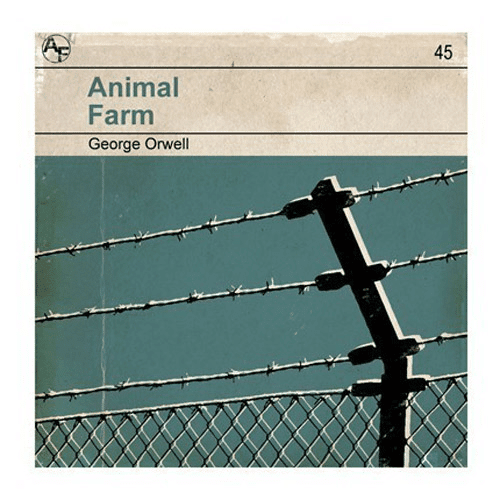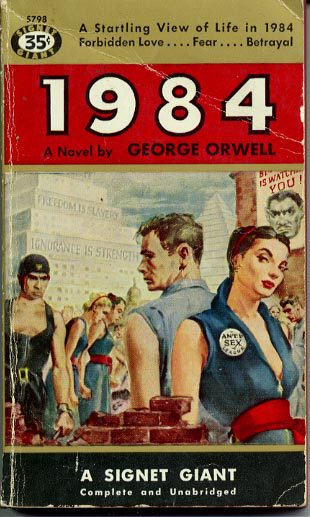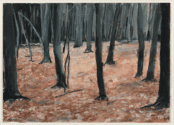[dropcap style=”font-size:100px; color:#992211;”]I[/dropcap] am very annoyed with The New York Times Book Review podcast.
They would go and make a fool of me for defending professional literary critics, wouldn’t they?
There I was in my pink rubber gloves, diligently doing the dishes while listening to podcasts from far-flung parts of the world when things started being said that made me splash soapy water, break wine glasses and prance angrily over dirty lino. It was a mess and I know precisely who is to blame.
There is no pretty way of introducing what I heard; the list of sins is long and of the most damning kind.
The topic was a newly published collection of George Orwell’s diaries called, simply, Diaries and the reviewer, Barry Gewen, was talking about Nineteen Eighty-four and Animal Farm. Hold tight, here we go:
“in addition to the pessimism …”
(NB: Gewen says pessimism, I say foresight, responsibility etc, but in the face of the crime to come that is a very small aside)
“ … what those books are most known for, is their attacks on totalitarianism, and I think for that reason they may be outdated. They may be the books that fall by the wayside because they were written at a particular period and had particular influence during the Cold War.”
Fall by the wayside? Outdated? Relevant only to a particular period?
I wonder what Gewen makes of the enormous surge in dystopian fiction of late, linked by threads about the size of – oh, I don’t know, a New York City bridge – to George Orwell’s Nineteen Eighty-four and the other dystopian greats.
Did he simply not notice the enormous amount of dystopian fiction that has been flying off bookshelves? Could he not have noticed the resurgence in dystopian literature, even though it is in the very pages of The New York Times Book Review – the most definitive meeting place between arithmetic and literature – that this nouveau dystopian turn has been documented?
I won’t lie, it worries me. Would it worry me if these words were a lone book blogger? Probably not, but when an established voice, an amplified voice, gets it so very wrong it’s confounding on a different level.
Gewen was presented on the podcast as an expert on Orwell, but how can he be if he doesn’t notice the real-time living legacy of Orwell’s most influential book? He couldn’t use words like “outdated” and “fall by the wayside” when discussing Nineteen Eighty-four if he wasn’t completely blind to the influence the book has today.
The fact that “Orwellian” is now a term that describes totalitarianism beyond the post-World War II period and the Cold War would, one might suspect, have provided more clues on the matter. Orwell himself was also absolutely clear regarding his own position:
“My recent novel is NOT intended as an attack on Socialism,” he said referring to Nineteen Eighty-four and added that his aim was specifically to show “that totalitarianism, if not fought against, could triumph anywhere.”
Orwell’s position is one that the book buying public has thoroughly endorsed.
My biggest fear is that Gewen dismissed the books that carry Orwell’s mantel because they are in large part books by women aimed at women and young people – demographics that are often sidelined by the established literati.
Women like Margaret Atwood, Ursula Le Guin and Lois Gowry eagerly delivered the popular dystopian legacy founded by Orwell into the twenty-first century; a mantel picked up by authors such as Suzanne Collins and Lauren Oliver. It is a connection that others at The New York Times Book Review haven’t missed. In a recent New York Times Book Review podcast about Lois Gowry’s latest novel, the last in her The Giver series, the links to and influence of Nineteen Eighty-four were endorsed by both Gowry and the interviewer.
To add to the insult the Diaries podcast include warning potential readers they may be disappointed by a lack of “gossip” and “sexual revelations” or bored by too many records “relating to daily life,” such as counting chicken eggs – warnings that were neither honourable nor insightful.
I think perhaps Gewen was trying to say that he prefers Orwell’s essays to his diaries and novels – a fair position to hold, but a case he left unmade.
Critics don’t get it right or wrong because of where they’re saying it – little book blog or enormous curator of cultural criticism; they get it right or wrong because of the quality of their insights. In this case The New York Times Book Review got it very, very wrong even though they are very, very established literati. I, on the other hand, have got it very, very right even though my voice echos from one side of the depths of obscurity to the other and back again.
Peter Stothart, Booker Prize panel judging chair, would have been just as correct in claiming that the status quo literati is ruining literary criticism as much as book bloggers.
Just because the method of doing the dishes changes it doesn’t mean the solution is to throw them into a hole in the garden, as tempting as it sometimes may seem. Dish by darstard dish, we will go on, caring more when the voice is amplified but trying to judge based on content rather than status.
____________
Orwell quote is from Sonia Orwell and Ian Angus (Eds.), 1968, The Collected Essays, Journalism and Letters of George Orwell IV, Secker & Warburg, London; p. 502.




















I see you don’t monetize your page, don’t waste your
traffic, you can earn extra bucks every month because you’ve got high quality content.
If you want to know how to make extra money, search for: best
adsense alternative Wrastain’s tools